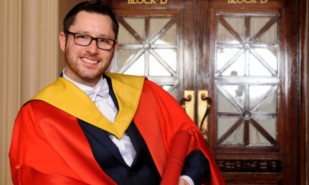It’s little more than 14 months since Gordon Aikman received the heart breaking diagnosis that he was living out a cruel, creeping, relentless death sentence.
In June last year, the now 30-year-old had it confirmed he had incurable motor neurone disease (MND).
At the time the former Kirkcaldy High School pupil and Edinburgh University graduate had only experienced numb fingers and weakening legs.
Since then he has lost the use of his hands almost completely and is wheelchair-bound most of the time.
The reality is that Gordon will soon lose control of his entire body and his life will be cut short.
According to the Motor Neurone Disease Association, 50% of sufferers, usually men in their 50s or 60s, die within 14 months of diagnosis and the remainder within five years.
Gordon already has a food tube fitted to his stomach in preparation for the day when he can no longer feed himself. He loves eating and is not thrilled at the prospect of “yucky grey sludge going in through a tube” just to keep him alive.
His “worst fear” is the day when MND robs him of his ability to speak and he suffers the indignity of “locked in syndrome”when his body shuts down and his still active mind becomes “trapped in a shell”, as he puts it.
He also has to decide soon whether to get a tracheostomy in preparation for the day when he might rely on a machine to breathe for him, potentially extending life by years.
“Is that for me? I don’t know,” he says with a shake of the head.
And yet despite such a bleak prognosis, Gordon has an amazingly positive approach to his degenerative condition and is now living his life in “fast forward”.
“My whole mind set is, this is as healthy as I’m ever going to be,” he tells The Courier in a painfully honest interview at his home in Edinburgh, “so if I don’t get out and enjoy it now it’s only going to be more difficult.”
His terminal diagnosis at the tender age of 29 has forced Gordon, a former Scotland squad gymnast and swimmer, to re-evaluate his life.
He’s travelled as much as he can holidaying just last week in Tuscany for example and in March married his partner Joe, a Holyrood political journalist, in a ceremony at Edinburgh’s Assembly Rooms.
Wearing Forrest Gump-style leg splints under his kilt socks, he was determined to walk down the aisle. “That was probably the last time I walked any distance,”he says. “It was such a positive day.”
In the summer he was “incredibly proud” to receive a doctorate from Edinburgh University.
And last week he received a special Kingdom FM Local Hero Award.
Perhaps his biggest achievement has been the raising of almost £500,000 through his high profile ‘Gordon’s Fightback’ campaign.
His action plan sets out clear goals that the Scottish and UK Governments need to achieve to help improve the care provided to Scotland’s 500 MND patients and help find a cure. Achievements so far include paying MND nurses from the public purse instead of charity donations; doubling the number of MND nurses and just this week guaranteeing MND patients a voice though eye-gaze technology and voice synthesizers, which can help patients communicate. He also wants to outlaw care charges, fast-track social security benefits, and, most importantly, persuade the Westminster government to double MND research funding.
But he knows time is against him.
It was November 2013 when he first realised something was wrong. At that time he was research director for the pro-UK Better Together campaign living a “fast, frenetic, crazy” life, and working all hours.
“I was trying to do buttons on my shirt and I just couldn’t. I was trying to tie my shoelaces and it was taking forever. I thought there’s something wrong here. I didn’t have time for it! I just wanted to go and get a packet of pills, and that would be the end of it. Sadly, it was a lot more complicated than that.”
He recalls the look of pain in the eyes of the young neurologist who broke news of the diagnosis to him at Edinburgh’s Western General.
He’s now dependent on his partner, carers and family, including mum Nancy who still lives in Kirkcaldy.
But the campaign keeps him focused.
He adds: “None of us know what’s round the corner. The only difference between me and you is that I know what will kill me and know roughly when. In many ways I’m lucky. I have not died suddenly in a car crash. I know my diagnosis. I know things are going to get worse. I could sit in here and watch the telly all day. But what kind of life is that?
“It’s too late for me. But my aim is to get rid of this thing so there aren’t more people like me. That’s the dream.”
To donate to Gordon’s Fightback, go to www.justgiving.com/gordonaikman/
